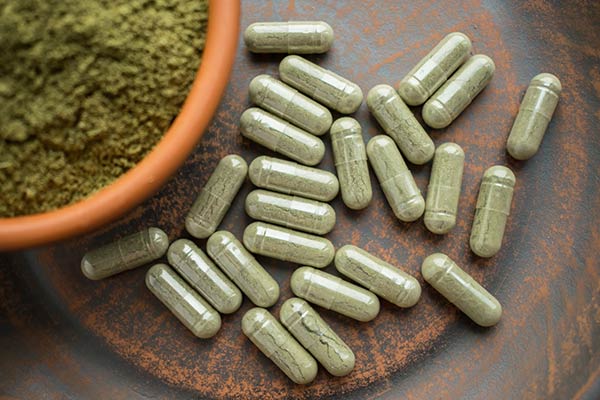Kratom has earned attention in recent years as being a natural remedy to help ease withdrawal symptoms associated with opiate addiction. Kratom is not recognized as an opioid. It is a medicinal herb indigenous to Southeast Asia but can affect similar brain responses that opiates’ effect. The National Institute on Drug Abuse explains how Kratom affects the human body and why it is sought after by drug addiction cultures that favor opioids and other addictive drugs.
Kratom can cause effects similar to both opioids and stimulants. Two compounds in kratom leaves, interact with opioid receptors in the brain, producing sedation, pleasure, and decreased pain, especially when users consume large amounts of the plant. One of Kratoms compounds also interacts with other receptor systems in the brain to produce stimulant effects. (NIDA)
However, Kratom can be addictive in itself and cause dependency. Often taking Kratom to ease opioid withdrawal symptoms replaces one addiction for another. Using Kratom by yourself to detox can lead to dangerous consequences, and it’s always best to get off opiates under the supervision of a medical detox program.
Kratom Suppresses Opiate Withdrawal?
NIDA explains the potential health hazards from consuming large amounts of Kratom and the symptoms that are likely to occur when someone has used too much Kratom. This substance is addictive and dangerous when taken in large quantities over a long period of time. Kratom is exported into the United States primarily through internet sales and can be bought at specialty stores that prepare Kratom leaves to be chewed, steeped into a tea, smoked, or mixed with other ingredients to form a powder to make a capsule to be swallowed. Supporters of Kratom consumption boast that it has curative and healing properties to reduce inflammation, lower stress, and other typical claims that many herbal remedies businesses commonly make. Many people who are attempting to ward off opiate withdrawal symptoms may inadvertently take too much and become very sick or may accidentally overdose and potentially die. The symptoms that occur when someone takes too much Kratom to suppress opioid withdrawal symptoms or to promote a stimulant effect include:
- Sweating
- Nausea and vomiting
- Itching
- Increased urination
- Constipation
- Loss of appetite
- Seizures
The Drug Enforcement Agency does not list Kratom as an addictive substance, but since Kratom has become a popular drug to abuse or to minimize opioid withdrawals, they are reconsidering how to schedule it as a narcotic. Currently, Kratom is only listed as a ‘drug of concern.’ Similarly, The Federal Drug Administration has not approved uses for Kratom either.
FDA is concerned that kratom, which affects the same opioid brain receptors as morphine, appears to have properties that expose users to the risks of addiction, abuse, and dependence. There are no FDA-approved uses for Kratom, and the agency has received concerning reports about the safety of Kratom. (FDA)
The real issue is less about Kratom and more about substance use disorder, also known as addiction. When a person becomes addicted to opioid drugs such as heroin, Fentanyl, Oxycodone, Dilaudid, Vicodin, and others, they will continuously need to ingest an opiate to prevent withdrawal symptoms from occurring. Once a person has become addicted to drugs that cause physical, mental, and emotional withdrawal symptoms, they become desperate. Opiate addiction causes individuals to use anything in an attempt to feel better. Not unlike other unusual herbs or drug concoctions that may reduce opioid withdrawal symptoms, Kratom is still just another substance that causes addiction.
Opiate Addiction Help
The solution for anyone who is addicted to opiates is to get help from a drug detox center. Evoke Wellness at Miramar offers specialized drug detox services. Our medical opioid detox center provides medically supervised Kratom and opiate drug detoxification. Since Kratom is favored by opiate and stimulant drug abusers, we offer advanced detox medications that allow a person to rest and recover. Our Medical Detox monitors each client around the clock. We provide one on one counseling, small group counseling, and soothing activities to participate in once an individual is physically stronger.



